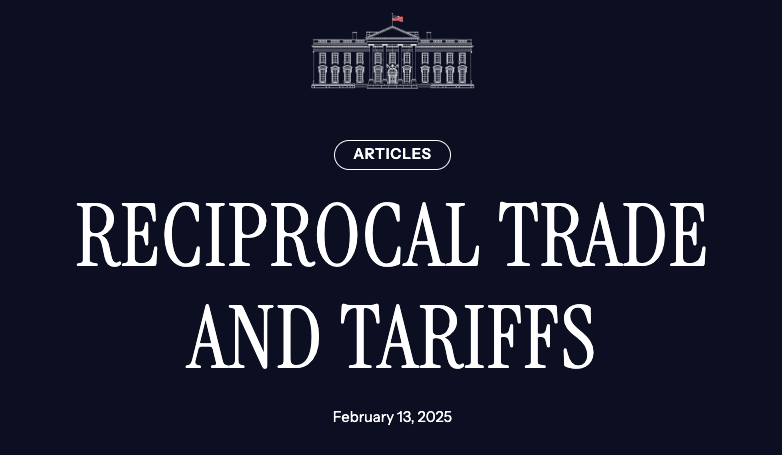On February 13, 2025, President Donald J. Trump announced the Fair and Reciprocal Plan, a new trade and tariff strategy aimed at addressing imbalances in international trade. This announcement follows the administration’s decision earlier in the week to impose 25% tariffs on steel and aluminum imports. According to President Trump, “The Fair and Reciprocal Plan will seek to correct longstanding imbalances in international trade and ensure fairness across the board.”
RECIPROCAL TRADE AND TARIFFS: MEMORANDUM AND FACT SHEET
A presidential memorandum released on February 13, 2025, details the administration’s approach to evaluating trade relationships and addressing disparities. It directs federal agencies to assess existing trade practices, including tariffs, taxes, regulatory measures, and currency policies, to determine their impact on U.S. industries. The findings will guide potential policy adjustments, including reciprocal tariffs, with the stated objective of fostering a more balanced trade environment.
In conjunction with this memorandum, the White House released a fact sheet, highlighting trade imbalances and non-reciprocal practices that impact U.S. industries. It provides specific examples of tariff disparities, restrictions on U.S. exports, and additional costs imposed on American businesses, including digital service taxes levied by foreign governments.
According to the fact sheet, these imbalances contribute to the U.S. trade deficit, which exceeded
$1 trillion in goods in 2024. The administration argues that reciprocal tariffs and policy adjustments will help restore fairness in international trade, enhance U.S. competitiveness, and strengthen economic and national security.
A White House statement on February 13, 2025, addressed the president’s Fair and Reciprocal Plan, emphasizing the administration’s focus on trade imbalances. The statement included endorsements from a variety of industry leaders, government officials, and lawmakers praising the initiative as a means toward strengthening American economic and national security. Supporters emphasized the impact of foreign trade barriers on ethanol, steel, and manufacturing, stating tariff disparities and restrictive polices have disadvantaged U.S. businesses. The administration asserts that reciprocal tariffs will promote fairer trade relationships while boosting domestic industries.
RECIPROCAL TRADE AND TARIFFS: IMPACT ON U.S. IMPORTERS, MANUFACTURERS, SUPPLY CHAINS
The Fair and Reciprocal Plan marks a major shift in U.S. trade policy, with direct implications for importers, manufacturers, and supply networks.
Manufacturers may see a more level playing field, particularly for industries facing higher foreign tariffs and restrictive policies. The plan may open new opportunities by challenging barriers to U.S. exports.
Importers reciprocal tariffs could lead to changes in sourcing strategies and increased costs, requiring careful assessment of supply options.
Supply Networks may experience shipping delays, inventory shortages, and potential disruptions that necessitate a supply chain reliance plan as part of their operational strategy.
Stay up-to-date on freight news with Green’s Weekly Freight Market Update by following us on LinkedIn. For continuous updates, make sure to check out our website at greenworldwide.com.





